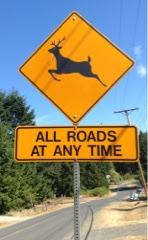As you leave the ferry terminal at Mayne Island and venture onto the vast network of roads, you are duly warned to watch out for deer. As in Greater Victoria, controversy rages over what to do about these gentle creatures, and here the problem is more serious, for without predators they have multiplied far beyond the capacity of the island to support them.
They are so hungry that they have stripped the island of young arbutus trees and the wildflowers that old timers remember from long ago. They will eat almost anything, including many deer-resistant plants. They have even taken to eating the pink insulation batts underneath our cabin. A serious problem indeed, and no solution is at hand. Unlike their rich cousins in Oak Bay, Mayne Islanders cannot afford to buy contraceptives for the deer at $250 a pop, or should I say "non-pop"?
So when driving on Mayne Island you should be on the lookout for deer. But I always chuckle when I pass the sign, for I imagine a sudden manifestation of deer on all the roads at the same time. Wherever they are, through some paranormal means of communication they must know when to leave the forest for the roads. And how well organised they must be to ensure that no street or lane is left unattended! In more precise language, the sign would have read:
Deer: On any road at any time
And here's another example of careless language. I don't want to seem insensitive, and I wouldn't write about this if I thought that anybody remotely connected with the tragedy would read it. Indeed, I have waited until the event is no longer current. Some time ago I noticed a headline in the newspaper which read:
Man killed at metal depot turned his life around
How could he could he turn his life around if he was dead?
The problem arises in the original headline because, reading the two verbs in the past tense, we assume that the actions happened in order. What we need here is a tense to show that one of the actions happened further back in the past, i.e., the past perfect or pluperfect tense:
Man killed at metal depot had turned his life around.
Now it makes sense.
